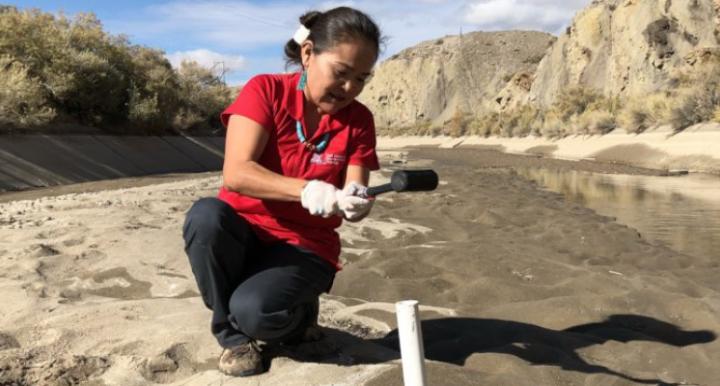Food Systems
A changing climate and environment need new and dynamic food system strategies. Arizona Environment researchers and Cooperative Extension agents and specialists work to reduce hunger and food waste, ensure rural and agricultural stability and livelihoods, and prevent environmental degradation.

For each new challenge presented in agriculture and food systems, UArizona researchers rise to find solutions. We live in the arid Southwest and combat dry conditions every year, but climate change is providing an array of new challenges, from reduced water availability for irrigation to new agricultural pests and contaminants. Global markets and complex food chain considerations, along with economic inequities, require new policy solutions to food waste, safety and security issues in communities. We explore the interconnections of water, energy and food solutions around the globe, within Arizona, and in indigenous communities.
Research Spotlights in Food Systems
Tom Evans
School of Geography and Development
Evans studies linkages and interactions between urban food security and rural agricultural production, including impacts from drought and climate variability.
Read moreChannah Rock
Environmental Science & UA Cooperative Extension
Rock’s studies include E. Coli contamination of romaine lettuce crops: environmental influences on bacterial persistence and distribution.
Read moreGary Nabhan
Southwest Center
Nabhan’s research interests include the conservation, restoration, and promotion of sustainable production of species of foods unique to North America and at risk of falling out of the American food system.
Read moreJoel Cuello
Biosystems Engineering
Cuello is working on growing food using a minimally structured, modular and prefabricated Vertical Green Box concept to meet modern food demand with less land, less water, less carbon emission, and greater yield.
Read more
ALEC provides critical data for public health decision making and water sustainability with their analyses of environmental contaminants such as lead, arsenic, TCE, and PFAS (per- and poly-fluoroalkyl substances).
Read more
APMC is an umbrella organization within the College of Agriculture and Life Sciences, whose goal is to create a working environment in which the science and implementation of Integrated Pest Management can thrive in Arizona.
Read more
BIO5 aims to harness the collaborative power of five main disciplines—agriculture, engineering, medicine, pharmacy, and science—to find bold solutions to address major challenges in the biosciences, biomedicine and biotechnology affecting humanity today.
Read more
The vision of the Controlled Environment Agriculture Center is to develop controlled environment agriculture as an economically, environmentally, and socially sustainable agricultural option.
Read more
Maricopa Agricultural Center has a goal to develop, deliver, and service the best integrated agricultural technologies for all problems faced by Arizona consumers and producers.
Read more
RRAC conducts large-scale field research projects in plant breeding, weed control, plant pathology, insect management, fertility & nitrogen management, soil conservation, alternative crops, and other areas of agronomic interest.
Read more
The UA RAFT testbed contains three 600-L open raceway growth systems and two larger scale raceway cultivation systems for small- and large-scale algae cultivation experiments, which include capabilities for low-heat solar-powered pumping, sumps to store cultures at night to conserve heat and increase winter productivity, and for harvesting biomass and recycling media.
Read more
The Southwest Center seeks to define, illuminate, and present, through research, teaching, and publishing, the character of the Greater Southwest: the heartland of Arizona, New Mexico, Sonora, and Chihuahua, and its peripheries.
Read more
The WEST Center is a world renowned venue focused on advanced treatment and detection of emerging microbial and chemical contaminants in municipal wastes and reclaimed water, alternative energy and related technologies.
Read more
The Yuma Center of Excellence for Desert Agriculture (YCEDA) is an innovative public-private partnership that addresses high-priority issues identified by industry stakeholders to improve all aspects of desert crop production systems and economics.
Read more




